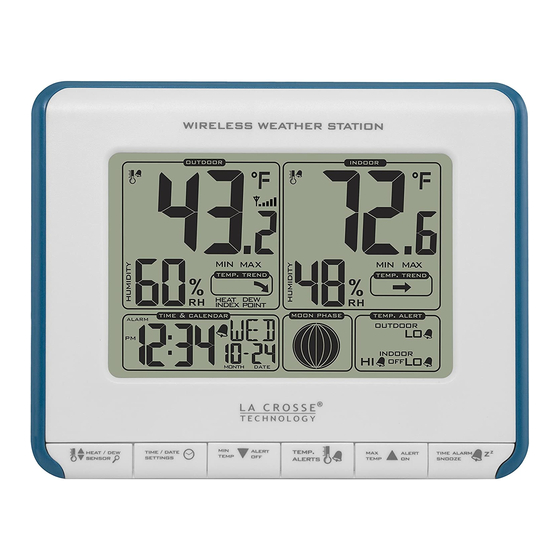Table of Contents
Advertisement
Quick Links
Wireless Weather Station
Welcome!
--------------
Congratulations on your new Wireless Weather Station and welcome to the
La Crosse Technology family! This product was designed with you in mind by our
hometown team of weather enthusiasts based in La Crosse, Wisconsin.
Instructional Manual
Model: 308-1711BL
DC: 031318
Wireless Weather Station
Advertisement
Table of Contents

Summary of Contents for La Crosse 308-1711BL
- Page 1 Welcome! -------------- Congratulations on your new Wireless Weather Station and welcome to the La Crosse Technology family! This product was designed with you in mind by our hometown team of weather enthusiasts based in La Crosse, Wisconsin. Instructional Manual Model: 308-1711BL...
-
Page 2: Table Of Contents
Table of Contents Step 1: Power Up Moon Phase Sensor Search Step 2: Mounting Basics Position Outdoor Sensor Step 3: Set Time, Date, etc. Low Battery Setting Menu Restart Your Weather Station Features Help Us, Help You! Alarm Time Let’s Be Social! Deactivate/Activate Alarm Care and Maintenance Snooze... -
Page 3: Step 1: Power Up
STEP 1: Power Up Insert batteries (in any order): • 2-AA batteries into thermo-hygro sensor (TX141TH-Bv2) • 2-AA batteries in your station ST E P 2 : Mo un t ing Ba sic s Wait until your sensor information should be displayed on your station. Here are a few quick tips for mounting your sensor: •... -
Page 4: Setting Menu
Settings Menu Note: The weekday will set automatically as the year, month, and date Settings order: are set. 1. Year 2. Month 3. Date 4. 12/24 Hour 5. Hour 6. Minutes 7. Fahrenheit/Celsius To begin: Hold the TIME / DATE button 2 seconds, then release, to enter the settings menu. Use the ARROW buttons to adjust values. -
Page 5: Alarm Time
Alarm Time Setting and activating time alarms are separate actions. 1. Hold the TIME ALARM button to enter alarm set mode. 2. Press the ▼ or ▲ buttons to adjust the values. 3. Press the TIME ALARM button to confirm & move to the next item. 2. -
Page 6: Set Temperature Alerts
Set Temperature Alerts Tip: Setting the alerts is one step. Arming the alerts is a separate step (see below) 1. Hold the TEMP ALERTS button until the station beeps. 2. The temperature alert value will blink in set mode. 3. Press the ▼ or ▲ buttons to adjust the values. 4. -
Page 7: Temperature/Humidity Trend Arrows
Temperature/Humidity Trend Arrows • The temperature (2°F / 1°C) trend indicators update every 30 minutes. • The humidity (3% RH) trend indicators update every 30 minutes or less. • 3 hrs. increments which changes on every ½ hour e.g.: At 3:00 — compares to 12:00 data; at 3:30 —... -
Page 8: Position Outdoor Sensor
If you have ideas for features or support solutions you’d like to see us make, please let us know! We truly want to make owning a La Crosse Technology product not only a practical experience, but also a fun one. So email us at: store@lacrossetechnology.com... -
Page 9: Care And Maintenance
• Promptly remove expired batteries. Warranty and Support La Crosse Technology, Ltd. provides a 1-year limited time warranty (from date of purchase) on this product relating to manufacturing defects in materials & workmanship. Before returning a product, please contact our friendly customer support with questions or visit our online... -
Page 10: Fcc Statement
FCC Statement This equipment has been tested and found to comply with the limits for a Class B digital device, pursuant to part 15 of the FCC Rules. These limits are designed to provide reasonable protection against harmful interference in a residential installation. This equipment generates, uses and can radiate radio frequency energy and, if not installed and used in accordance with the instructions, may cause harmful interference to radio communications.
















Need help?
Do you have a question about the 308-1711BL and is the answer not in the manual?
Questions and answers